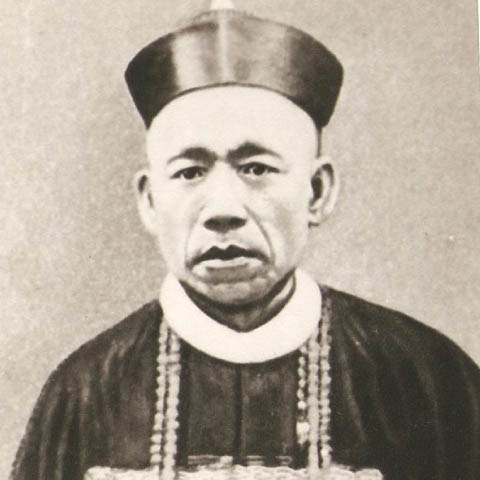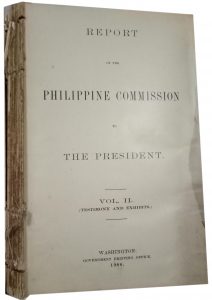 Editor’s Note: For this issue and the next, we are reprinting Carlos Palanca’s testimony before the Philippine Commission on June 30, 1899 and July 8, 1899. Carlos Palanca or Chan/Tan Quiensien (陳謙善) was a famous capitan chino during the latter part of the Spanish period, in the 19th century. He also served as acting consul general of China in 1899 until the appointed official Chinese consul general, his son Engracio Palanca/Tan Kang (陳剛), was able to assume the position.
Editor’s Note: For this issue and the next, we are reprinting Carlos Palanca’s testimony before the Philippine Commission on June 30, 1899 and July 8, 1899. Carlos Palanca or Chan/Tan Quiensien (陳謙善) was a famous capitan chino during the latter part of the Spanish period, in the 19th century. He also served as acting consul general of China in 1899 until the appointed official Chinese consul general, his son Engracio Palanca/Tan Kang (陳剛), was able to assume the position.
Carlos Palanca had profound knowledge on the Chinese in the Philippines as well as Philippine economic situation, and was twice invited to testify before the Philippine Commission to provide information in order to help formulate United States policy on the Philippine Chinese, as well as how they were supposed to deal with the Chinese problem in their newly acquired colony.
The Philippine Commission, the governing body of the early American period, conducted marathon hearings, in a bid to acquire all the information needed to govern the Philippines.
Such information and knowledge from the hearings and studies were published in the voluminous Report of the Philippine Commission submitted to the US President for reference. Volume 2 of the Report, published in 1900, was mainly on the Chinese in the Philippines. Many resource persons, including foreigners and local merchants and government officials, were invited to the hearings conducted in 1899. But only two Chinese were invited.
One was Carlos Palanca, the other was A.R.M. Ongcakwe. The testimony of Ongcakwe was short, which was reprinted in Go Bon Juan’s column Gems of History (Tulay, May 8-21, 2018 issue). Carlos Palanca’s two testimonies, however, were quite long. They highlighted his extensive knowledge and expertise in many subjects.
Palanca’s two testimonies are reprinted not only in order to introduce and share the historical information he gave to the American colonizers, but also to preserve and share these two very important and precious historical documents on the Chinese in the Philippines. Needless to say, the copy of the Report of the Philippine Commission is quite rare nowadays. It is quite difficult for scholars and researchers to have access to this kind of rare historical document. We encourage people to keep these two issues of Tulay in order to preserve Palanca’s two 1899 testimonies.
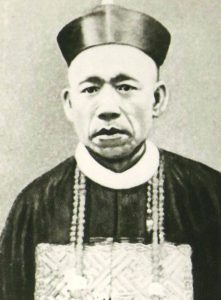 Testimony of Carlos Palanca
Testimony of Carlos Palanca
Manila, June 30, 1899
Present: Colonel (Charles H.) Denby (in the chair), Professor (Dean C.) Worcester and John R. MacArthur.
Carlos Palanca (Chinese name, Chan Quiensien), in response to questions, answered as follows:
By Colonel Denby:
Q: Please give us your name, age, residence and occupation.
Carlos Palanca, A: residence, Manila; occupation, merchant.
Q. How long have you lived here?
A. Forty-three years. I came here and commenced in the draper business, piece goods. At present, I am in the sugar and rice business. I do every kind of business. I am a contractor also.
Q. Do you do any work for the Government, for the United States?
A. I do a lot of work for the United States.
Q. What do you do?
A. Get the coolie laborers out to the lines, building barracks.
Q. What else?
A. I am also a ticket broker.
Q. Have you anything to do with carabaos? Do you furnish transportation of any kind?
A. When the Americans came here, I furnished the carabaos on the transportation lines. In September, October and November, I furnished all the carabaos and transportation.
Q. Was that work done for the Government of the United States? What other work did you do?
A. I used to give a lot of information to the American Government, and assisted in getting houses in the commencement for the troops, furnishing my own godowns out at San Miguel for the quartering of the troops, too.
Q. You are the most important Chinese merchant here, aren’t you?
A. Ever since I have been here, 43 years. I have twice been the Chinese captain.
Q. What is that?
A. He was appointed by the Spaniards at that time.
Q. That is, you are the headman?
A. Yes.
Q. How many Chinamen have you got under you?
A. Over 40,000 men at a time.
Q. Are you the captain now?
A. I am not captain now, as there is a consul now. I was acting consul (for) four months also.
Q. When you say 40,000 men, do you mean that to cover all the Chinese who are in the Philippine Islands?
A. Yes.
Q. How many are there in Manila?
A. Twenty-two or twenty-three thousand Chinese in Manila.
Q. How many of them come here every year?
A. Formerly in the Spanish time, the Chinese that came here amounted to between ten and twelve thousand, and those returning to China between seven and eight thousand a year.
Q. Do the seven or eight thousand go for good – go to stay?
A. They don’t go for good; they generally return here. They go to China in the sixth moon and in the eleventh moon of the Chinese year they return to China. They come back again to Manila in the Chinese eighth moon of the third after spending the feast of the seventh moon of the Chinese year.
Q. Do the Chinese who come here bring their families – their wives?
A. Some of them do and some of them don’t.
Q. Do many of them bring their wives?
A. In Manila, there are about 2,000 women.
Q. Married women?
A. Some of them are married; some of them are concubines – like second wives.
Q. They are allowed to have more than one wife here, are they?
A. Only one here.
Q. Well, they are allowed concubines?
A. Yes, even the Spaniards do that. The Filipinos do that. The Filipinos sometimes have as many as four.
Q. Are there many children born here – Chinese children?
A. About 100 or 200 children here.
Q. Don’t the Chinese marry Filipino women?
A. Yes.
Q. Do they make good husbands?
A. Yes; but there are some exceptions, too.
Q. Don’t they generally take care of their families and their wives?
A. Yes; I will mention just now that there are about 300 Chinese deaths here during a year.
Q. Grown people or children?
A. Grown-up men and children.
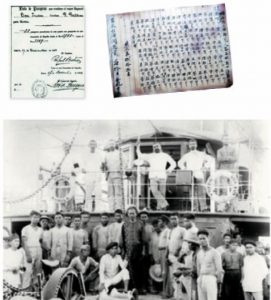
Q. How many Chinese come here every year?
A. Between ten and twelve thousand men come here every year.
Q. What is the regulation about their coming? What was the regulation under the Spanish rule?
A. They were at liberty to come. There was a year once, one time, when 15,000 Chinese came. In 1863, 15,000 men came here.
Q. Did they have to pay anything to get in?
A. In 1863, when I came here, there were only about 20,000 Chinese. In that year, 15,000 more came over.
Q. Did they pay anything to the Spanish Government or was it entirely free?
A. In the commencement, the rule was that the newcomers were allowed to come free for a year. After the expiration of the year, he had to pay $6.
Q. Each man?
A. Yes.
Q. Did the women pay anything?
A. When he was 18 years of age, he had to pay $6.
Q. Did the women pay anything?
A. Three dollars.
Q. Nobody paid anything until they had been here a year?
A. Not for the first year. Then it was altered to six months.
Q. Then they paid after six months?
A. Yes, sir.
Q. What do they pay now, anything?
A. Now they simply pay one peseta for a cedula.
Q. They pay for a cedula?
A. Yes.
Q. How much do they pay for that?
A. Twenty cents.
Q. They pay, then, like anybody else?
A. Everybody pays 20 cents; yes, sir.
By Professor Worcester:
Q. He said at the beginning they paid nothing for one year.
A. In the commencement when the rule was made, they were exempt for a year; then it was altered to six months; then after 1873 Governor Carraro ordered a fee to be paid as soon as the Chinese landed.
Q. How much?
A. Six dollars.
Q. Well, when the Americans came here – that is to say, last summer a year ago – what was the rule?
A. They had to pay 25 cents.
Q. Isn’t that all they paid to the Spanish Government? I mean before the Americans came, what was the rule?
A. They had to pay $6.
Q. And when the Americans came, it was put down to 20 cents; is that what you mean?
A. Twenty-five cents.
Q. What do they pay now?
A. At present, they pay the cedula personal.
Q. Twenty cents?
A. Yes.
By Professor Worcester:
Q. Didn’t they have to pay $50 apiece to get in at one time?
A. That included all the passage money and all the food and duties on landing, etc., which made up the $50.
Q. I mean, didn’t they have to pay a tax to the Government of $50 at one time?
A. No; they had to pay $6, and another $3 for the industrial fund, and another sum of 25 percent on something else, which amounted, in 1889, to about $9.89.
Q. Now they only pay 20 cents?
A. They pay 20 cents and some registration fee to the Chinese consulate.
Q. That goes to the Chinese consulate and not to the Government?
A. Yes.
Q. How much do they pay to the Chinese consulate?
A. Formerly, when I was acting consul, I got only 25 cents. At present, the new consul – I don’t know what amount the new consul is collecting from the Chinese for registration.
Q. The consul puts that money in his pocket?
A. Yes.
Q. What do the Chinese do after they come here – what labor?
A. It is not easy to mention all that they do. However, when they get here, they go to their trade or they go to these timber yards, or are employed by these other merchants, or they are employed for the provinces in order to go and carry sugar and hemp, and in any kind of work generally.
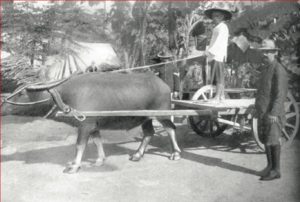
Q. Are they industrious, good workmen?
A. They are industrious; they are good workmen.
Q. If there were no Chinese here, couldn’t the Filipinos do the work that the Chinese do?
A. Formerly, in the Spaniard’s time, about 70 or 80 years ago, there were no Chinese here, and so the Filipinos couldn’t do anything; they had no vegetables, they had no proper workmen, they couldn’t do anything, and Simon de Anda, the governor, asked somebody to go to China and get the Chinese to come here and do the gardening work in these islands. The governor sent Mantayou de Pico to go to Canton, and he got a great many Chinese.
Q. From what part of China did the Chinese come to the Philippines?
A. From the province of Fochien.
Q. What is the chief city?
A. Foochow.
Q. Did any come from Amoy?
A. Generally, every one of them come from Amoy. They go to Manila and Bulacan.
Q. Did any come from Canton?
A. Yes; very few, only about 3,000 from Canton are here.
Q. They mostly come from Foochow and Amoy?
A. The capital is Foochow, the province is Fochien, but the people come from Amoy.
Q. Is Amoy in Fochien?
A. Yes.
Q. What do you think would be the probabilities of their coming, as to the numbers that would come under the American flag?
A. At present in the Philippine Islands, there are many possibility of mines – silver mines, copper mines – and there are no men to work them.
Q. I ask, what do you think of the probability of their coming in great numbers?
A. Then the Philippines would be wealthy.
Q. Do you think they would come in great numbers or not?
A. Well, of course, they have simply to pay this one peseta, and I think there will be a great many Chinese who will come here. There are about 400,000 Chinese in Singapore and all districts around about Singapore, down to the Malay States – 400,000 Chinese there.
Q. How many hundred thousand do you think would come here from China?
A. I cannot say how many hundred thousand will come, only that Chinese cannot live along with the Filipinos, because the Filipinos will kill them.
Q. Why do the Filipinos object to the Chinese?
A. The Filipinos have a lot of vices, cockfighting, gambling, etc., and the Chinese have come here to work and get their living in order to provide their families in China and to lay by something for themselves.
Q. And is that the reason the Filipinos hate them?
A. Yes; the Filipinos does do not like the Chinaman because he goes in poor clothing, wears one coat that costs him 20 cents, and trousers that cost 20 cents. As the Chinese are so miserly and do not spend their money, they are hated by the Filipinos, because the Filipinos no doubt dress in nice clothes and wear shoes and all sorts of things, and don’t care for work.
Q. How can the Filipino work if the Chinese do all the work?
A. There would be work for 500,000 men – there would be much more work for them – because there is a lot of land for agriculture and there are no men to do the work.
Q. Do you think there would be plenty of work for all?
A. Any amount of work. There will be several hundred thousand tons of timber to be worked up.
Q. Can you tell us anything about the mines?
A. In Ilocos, there are copper mines. There are gold mines in Camarines; also in Cagayan.
Q. How about coal mines?
A. there are coal mines in Cebu.
Q. What about copper mines?
A. There are copper mines in Ilocos.
Q. Any tin mines?
A. Tin in Bulacan. There are some iron mines at Angat.
Q. Any more mines? Tell us all about them.
A. In Nueva Ecija, there are gold mines, too. There are other mines which have not been prospected.
Q. Well, these mines that you mention; have they been worked?
A. Only the copper mines have been worked; but they do the mining work there as long as there are any men to do it.
Q. Do the Chinese work in any of these mines?
A. Formerly, when the Spaniards hired the Chinese they worked in the mines. The copper mines at Ilocos were worked by Don Tomas Castro. The coal mine at Cebu is worked by Don Rafael Reyes.
Q. Do these people employ Chinese?
A. Yes; they employ Chinese. They have no machinery; they simply work with their hands and pickaxes.
Q. Do you think that we could get Chinese to come over and go into the mining business?
A. With the employment of machinery, you are bound to be successful, and if you would employ Chinese they are bound to come, too.
Q. Can’t the Filipinos work in these mines?
A. The few Filipinos that work, and get a certain amount of money today, won’t work tomorrow; they will stop work when they have got a little money.
Q. Do you think there could be a limit put on the number of Chinese that would come here?
A. I don’t think that a limit should be put.
Q. You think all should be allowed to come that want to come?
A. I think they should be allowed to come at present. The situation is not settled. As soon as everything is settled and everything is quiet and in working order, there will be any amount of work required. At present Smith, Bell & Co. wanted to engage some Chinese to go down to some of the out ports, and they had to pay $30 to each man.
Q. To whom?
A. To each Chinese, to get them to go down to Iloilo.
Q. Do you mean they had to pay that as passage on the ship?
A. No; he had to pay that for each man, $30 a month for a coolie.
Q. Is that good wages?
A. The wages are very good; but then take into consideration that they have to go down to Iloilo.
Q. What are the ordinary wages of Chinese laborers here a day?
A. During the loading of ships they get from $1.50 to $2 a day; but there are not always ships loading here.
Q. How much do these men get that carry burdens in the streets here?
A. Fifty cents to 75 cents a day. At present, there is not much work to be done, so of course they get less. As soon as everything is settled, there will be more work and they will be able to get more.
Q. How much do men get a day for driving one of these carabaos?
A. At present, one cart load of goods to be brought from Rosario down to the river side to be shipped on board has to pay a day’s hire, and that depends on the amount of goods they have.
Q. They have the cart and all?
A. Yes, sir.
Q. I asked how much the driver would get?
A. The carabao belongs to the man, too.
Q. He gets a dollar a load?
A. Yes, sir.
Q. But the carabaos do not generally belong to the men, do they?
A. There are some people who simply own these carabaos and carts and hire them to these men, and they get half of whatever is earned.
Q. Do the Chinese learn any other language when they come here?
A. Formerly, during the Spanish time, when they came here they learned Spanish and Tagalo. At present, when they come here they try to learn English and Tagalog.
Q. Why do not the Chinese when they come here bring their families and live here like other people do?
A. In Manila and the Philippines generally, the rent and living are so dear, and it is so much cheaper to stay in China and live there that they leave their families there.
Q. Do the Chinese come here intending to make this their residence and stay here for good?
A. It depends upon the state of feeling of the Filipinos. When they are peaceable, more of the Chinese will come here and stay for good, just as they do in Singapore and the Straits; they will live here for several generations.
Q. What kind of a man is the mestizo, half Chinese and half Filipino?
A. In the commencement, a Chinaman marries a Tagalo woman and they get children from that marriage, and their children marry in time and the descendants of that marriage are called mestizos.
Q. Do they make good citizens?
A. The mestizos are the wealthiest Filipinos in the place.
Q. Then they have a good deal of the intellectual talent?
A. They haven’t got very good intellects.
By Mr. MacArthur:
Q. If they haven’t got good intellects, how can they make money?
A. They get profit out of their wealth – interest, usurious profits. They give a dollar and get four pots of sugar.
By Colonel Denby:
Q. Haven’t they – the mestizos – got more intellect than the ordinary Chinese?
A. Those that have been educated – those that have got good schooling – are much better; but with regard to very good intellects are very few.
Q. The Chinese that come here are generally uneducated, aren’t they?
A. Yes; the well educated do not come here; it is only those that have very little to begin with who come here to be clerks. When I came here, I was only 14 years of age. I had no education whatever, and on arriving here, I had to learn any kind of trade that was handy. I know all about the affairs of all the people in the Philippines.
Q. You have made a good deal of money, haven’t you?
A. Yes; I made a lot of money, but I spent a lot of money, too.
By Mr. MacArthur:
Q. Would it be possible to adopt measures by which the Chinese that come here should be identified and known to the Government and their whereabouts ascertained at all times?
A. Formerly, during the Spaniards’ time, the Chinese captain managed all that. A register of each man’s name, his residence, age, and all his connections, was kept by the Chinese captain. Now, as there is a Chinese consul, all these records and registries have been transferred to this consul. If anybody wants to find out anything about a man, he can make inquiries there, and he will be informed where the man lives, etc., and whenever the Government requires any man or wants any information, it can simply write to the Chinese consul and make any inquiries, and he is bound to supply the information needed.
During the Spaniards’ time, the captains of the ports, the chief justices, the governors, and all those other persons, if they wanted to find out anything about a certain man, they simply got the man’s name and wrote to the captain of the Chinese, and the captains of the Chinese would have to forward the man up. The Spaniard only governed a very small part of the Philippines. The interior has never been governed nor brought under government, and these interior people were never baptized, especially the Igorrotes. If the Americans will take steps peaceably to pacify them, they will be able to get all of them. The Igorrotes refused to be baptized, because they said they would have to pay certain fees; that they would have to pay fees for burials, etc., to the priests, and therefore they refused to be baptized.
Adjourned.
(To be continued)
